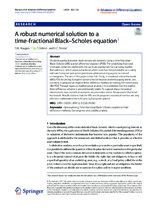| dc.contributor.author | Nuugulu, S.M | |
| dc.contributor.author | Gideon, F | |
| dc.contributor.author | Patidar, K.C | |
| dc.date.accessioned | 2021-04-14T12:11:54Z | |
| dc.date.available | 2021-04-14T12:11:54Z | |
| dc.date.issued | 2021 | |
| dc.identifier.citation | Nuugulu, S.M. et al. (2021). A robust numerical solution to a time-fractional Black–Scholes equation. Advances in Difference Equations
2021(1),123 | en_US |
| dc.identifier.issn | 16871839 | |
| dc.identifier.uri | 10.1186/s13662-021-03259-2 | |
| dc.identifier.uri | http://hdl.handle.net/10566/6021 | |
| dc.description.abstract | Dividend paying European stock options are modeled using a time-fractional
Black–Scholes (tfBS) partial differential equation (PDE). The underlying fractional
stochastic dynamics explored in this work are appropriate for capturing market
fluctuations in which random fractional white noise has the potential to accurately
estimate European put option premiums while providing a good numerical
convergence. The aim of this paper is two fold: firstly, to construct a time-fractional
(tfBS) PDE for pricing European options on continuous dividend paying stocks, and,
secondly, to propose an implicit finite difference method for solving the constructed
tfBS PDE. Through rigorous mathematical analysis it is established that the implicit
finite difference scheme is unconditionally stable. To support these theoretical
observations, two numerical examples are presented under the proposed fractional
framework. Results indicate that the tfBS and its proposed numerical method are very
effective mathematical tools for pricing European options. | en_US |
| dc.language.iso | en | en_US |
| dc.publisher | Springer Nature | en_US |
| dc.subject | Option pricing | en_US |
| dc.subject | Time-fractional Black–Scholes equations | en_US |
| dc.subject | Finite difference methods | en_US |
| dc.subject | Convergence and stability analysis | en_US |
| dc.title | A robust numerical solution to a time-fractional Black–Scholes equation | en_US |
| dc.type | Article | en_US |

